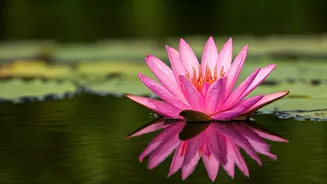Lotus: An Overview
The lotus flower, a symbol of purity and beauty in many cultures, is much more than just a pretty bloom. In traditional medicine, particularly in India,
the lotus has been used for various purposes, including hair care. The different parts of the lotus plant, such as the petals, seeds, and roots, contain various nutrients and compounds beneficial for the body. When it comes to hair, the lotus is believed to possess properties that can stimulate growth, strengthen hair follicles, and add luster to the hair. Its popularity is due to the compounds within it, which are antioxidants and provide vitamins that can prevent damage to the hair. The flower also has hydrating and moisturizing properties, making it beneficial for dry or brittle hair. Throughout history, the lotus has been associated with spirituality and wellness, and its use in hair care is yet another way to incorporate its holistic benefits into your daily routine.
Lotus for Hair Health
The lotus flower's impact on hair health is multifaceted, primarily due to its unique composition. It is packed with vitamins and minerals, essential for promoting hair growth and maintaining a healthy scalp. Antioxidants in the lotus help combat free radicals, which can damage hair cells and hinder growth. These antioxidants protect hair from environmental stressors like pollution and UV rays, preventing premature graying and hair fall. The natural moisturizing properties of lotus ensure that the scalp is hydrated, reducing dryness and itchiness that often lead to hair damage. Lotus also helps in improving blood circulation in the scalp, which in turn nourishes hair follicles, encouraging robust hair growth. By regularly using lotus-infused products or treatments, one can experience stronger, shinier, and more voluminous hair, making it a valuable addition to any hair care regimen.
Using Lotus for Hair
Incorporating lotus into your hair care routine is simpler than you might think. One common method involves using lotus flower extracts or oils. These can be found in various hair care products like shampoos, conditioners, and hair serums. When selecting products, it's wise to check the ingredients list to ensure that lotus is one of the primary components. You can also create homemade hair masks using lotus petals. To make a simple mask, blend fresh lotus petals with water or other beneficial ingredients such as aloe vera or coconut oil. Apply this paste to your hair and scalp, leave it on for about 30 minutes, and then rinse thoroughly. Another way to use lotus is to boil lotus flowers in water and use the infused water to rinse your hair. This helps in adding shine and softness. For optimum results, use these treatments consistently, at least once or twice a week, alongside a balanced diet and healthy lifestyle to maximize the benefits and witness a noticeable improvement in your hair's overall health and appearance.
Lotus Hair Mask Recipes
Crafting your own lotus-based hair masks at home allows for a more personalized and natural approach to hair care. A basic lotus petal mask can be made by grinding fresh lotus petals into a smooth paste using a blender or mortar and pestle. Add a bit of water to get the desired consistency. For extra benefits, you can add a tablespoon of honey for added moisture and shine. Apply this mask evenly to your hair and scalp, ensuring full coverage, and leave it on for about 20-30 minutes before rinsing thoroughly with cool water. Another variation includes mixing lotus petal paste with coconut oil, known for its deep conditioning properties. Combine the paste with two tablespoons of coconut oil, apply it to the hair, and leave it on for at least an hour before washing it off. This mixture is excellent for dry and damaged hair. For an extra nourishing mask, add a few drops of essential oils such as lavender or rosemary, known for stimulating hair growth, to the lotus paste before application. The best thing is to experiment and find what suits your hair type for best results.
Additional Lotus Benefits
Beyond its direct impact on hair health, lotus offers a range of other benefits that contribute to overall well-being. It is rich in antioxidants that fight free radicals and reduce inflammation, which can improve skin health. Regular consumption of lotus root, a common ingredient in Asian cuisine, can boost immunity due to its vitamin C content. Lotus seeds are known for their calming properties, helping reduce stress and anxiety, which indirectly benefit hair health by preventing stress-related hair fall. The lotus also has anti-aging properties, promoting youthful skin and body. For the hair, the nutrients in lotus can strengthen hair follicles, which reduces hair loss. The soothing properties help relieve scalp irritation and dandruff, which is why lotus-infused products are sometimes used to treat these. Overall, integrating lotus into your lifestyle not only improves hair health but also promotes holistic well-being.














